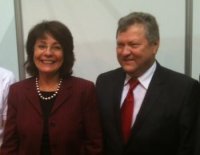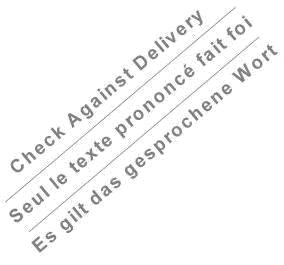A new Fisheries Policy for Europe

AGROBALT Exhibition "For a Healthier Life"
Kaunas, 10 May 2012
Commissioner Maria Damanaki visited Lithuania on May 9 and 10, 2012 to present the reform of the EU's Common Fisheries Policy to Lithuanian decision makers and stakeholders of the fishing sector. On May 9, the Commissioner met Kazys Starkevičius, Lithuanian Minister of Agriculture and took part in a special session of the Lithuanian Parliament on on the reform of the Common Fisheries Policy. She also had a meeting with Prime Minister Andrius Kubilius.
On May 10, in Kaunas, Commissioner Damanaki delivered a speech during the official opening ceremony of the exhibition AgroBalt 2012, alongside the President of Lithuania, Dalia Grybauskaite, Prime Minister Kubilius and other personalites.

Dear Madame President, dear Prime Minister, Excellencies, ladies and gentlemen,
It is a real honour to visit AGROBALT and to see at first hand how much your country has to offer in the farming sector. I am very impressed by what I have heard so far about this fair. You know, my background is engineering and therefore I will look forward to seeing here at AGROBALT what you are doing on the agro-chemistry side. And as a consumer I hope to try some delicacies that your country has to offer. I am told that your Skilandis is excellent. Farming has a great advantage to fishing: farmers can plant their crops and they can buy their livestock. Unfortunately in fishing we don't have this advantage, so the best thing we can do to make sure that we are still in business in 50 years from now is to take good care of our fish stocks, as farmers are taking good care of their livestock.
 As informed citizens, you know that fish is universally acclaimed as a healthy component of our diet. We all know it is rich in protein, but it's not just that: it contains brain-specific nutrients, the omega-3 fats, which our body cannot produce, and must get from the diet. These fats benefit mental health throughout our life cycle, from pre-natal stages to old age.
As informed citizens, you know that fish is universally acclaimed as a healthy component of our diet. We all know it is rich in protein, but it's not just that: it contains brain-specific nutrients, the omega-3 fats, which our body cannot produce, and must get from the diet. These fats benefit mental health throughout our life cycle, from pre-natal stages to old age.
So it is no surprise that the world should be consuming more seafood every year. But where should all the necessary fish come from?
This is precisely my challenge as Commissioner for Maritime Affairs and Fisheries: I have to let Europeans get as much fish as they need; but at the same time I also have to ensure that natural resources are not over-exploited: that they are used sustainably.
Over the years the Common Fisheries Policy has become too complex, because too much detail is decided at central level; more importantly, short-term economic interests often seem to prevail over the long term interest of the fishing industry.
It is now time to turn this around and this is what I am doing in the Reform of this Policy. I propose that some decisions should be taken on a regional level and you are already at the forefront with Baltfish. I also propose to change the way we fish to ensure a higher and stable income for fishermen and their families. A new way of fishing which phases out the practice of discarding fish overboard.
I know, that discarding fish overboard is not a problem in the Baltic Sea, but in the North Sea and the Atlantic it is a real problem; the fact that we have huge amounts of discards there, harms the reputation of all fishermen, including Baltic ones. It is in everybody's interest to remedy this situation – otherwise consumers will turn away from a very healthy product simply because they are unhappy with the waste that goes with it.
With the reform I also want to look for ways to develop fish farming, both on land and marine. I want aquaculture to become part of the supply solution - and I am convinced it can be an important source of growth, jobs and stability for Lithuania and all other countries in Europe.
We also believe that the new system should adapt to each region's heritage, tradition and know-how; I look at the variety of unique cheeses and dairy products that Lithuania exports to the rest of Europe, for example, and I understand the wide variety, the richness of each country or even each region of Europe.
Not only should this heritage not be lost, it should be cherished. The Lithuanian fishing industry, with its knowledge of the seas, will be able to play its part in the conservation of resources and come up with the best solutions to achieve sustainable resource use.
So, the reform is about giving a future to the Lithuanian fishing industry, but also to coastal areas as a whole.


